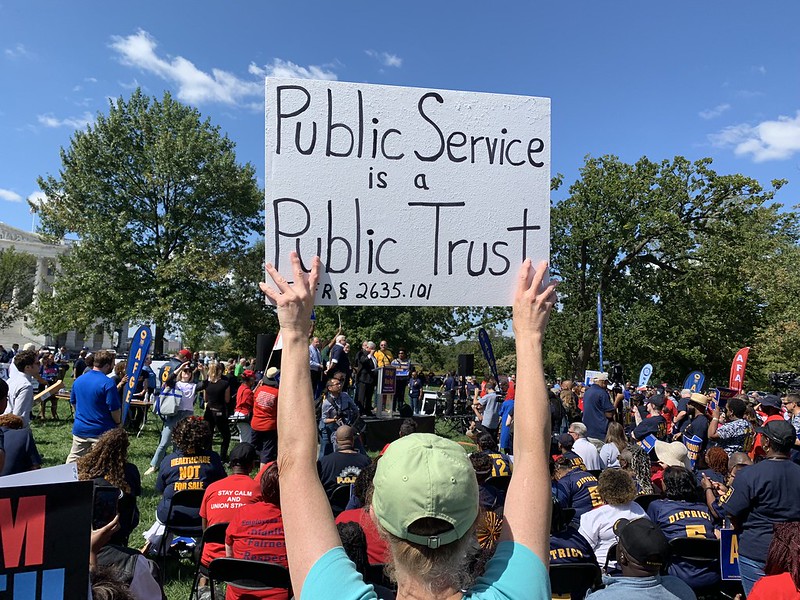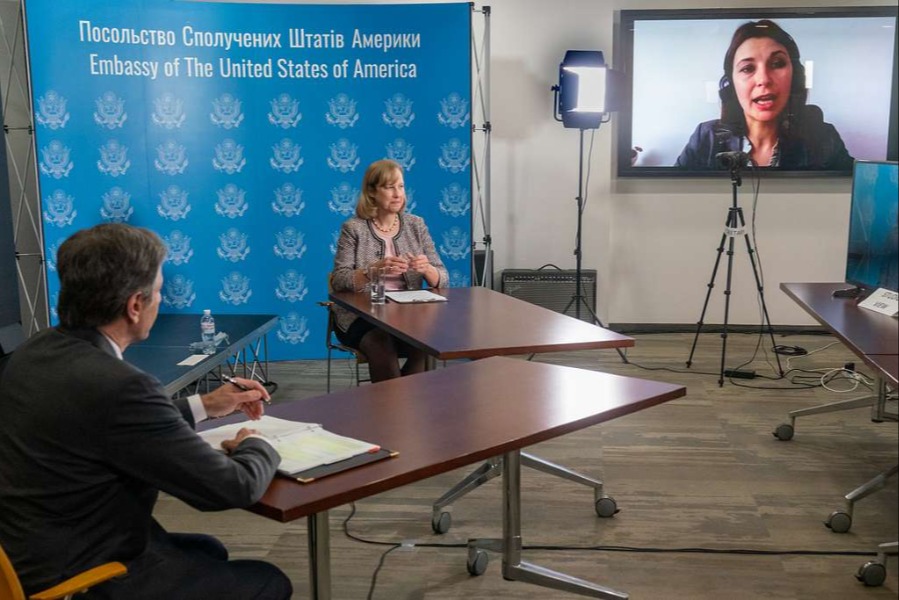The Khobragade Kerfuffle: An Assessment
The last few days have seen a flurry of diplomatic and law enforcement activity in both the United States and India that may bring the month-long Khobragade controversy to an end. In this post, I try to unpack some of the applicable international law and U.S. policies involved. In a nutshell, although the U.S. Government acted consistent with its treaty obligations, the State and Justice Departments appear to have overreacted and mishandled their initial response to Ms. Khobragade’s transgressions, causing harm to the U.S.-Indian relationship and creating security and legal risks for U.S.
Published by The Lawfare Institute
in Cooperation With

The last few days have seen a flurry of diplomatic and law enforcement activity in both the United States and India that may bring the month-long Khobragade controversy to an end. In this post, I try to unpack some of the applicable international law and U.S. policies involved. In a nutshell, although the U.S. Government acted consistent with its treaty obligations, the State and Justice Departments appear to have overreacted and mishandled their initial response to Ms. Khobragade’s transgressions, causing harm to the U.S.-Indian relationship and creating security and legal risks for U.S. diplomats both in India and around the world. Over at Opinio Juris, my friend Julian Ku says the “State Department Deserves an ‘F’ on their Handling of the Indian Consul Flap.” Although I suspect that equal or greater responsibility for the flap should lie with the Department of Justice, I agree that the matter was initially bungled, as I explain in more detail below the break. Fortunately, the State and Justice Departments, and the Indian Government, now seem to have worked harder to resolve this diplomatic row.
To recap the recent developments: last Wednesday, the State Department accepted Ms. Khobragade’s transfer from the Indian Consulate in New York, where she had been Deputy Consul General, and re-accreditation to India’s Mission to the United Nations; on Thursday, she was indicted for visa fraud and false statements by a grand jury in the Southern District of New York; the State Department then asked India to waive the immunity to which she was entitled under the U.S.-U.N. Headquarters Agreement and India refused; the State Department then declared her persona non grata and asked India to withdraw her from the United States; she left the United States on Thursday night; in response, on Friday, India (which had initially retaliated by reducing security around the US Embassy in New Delhi and curtailing privileges for U.S. diplomats) then asked the State Department to withdraw a U.S. diplomat assigned to the U.S. Embassy in New Delhi (a diplomatic security official who reportedly had helped to bring the family of Ms. Khobragade’s nanny from India to the United States); and on Saturday, India’s External Affairs Minister stated that India’s “immediate, immediate concerns have been addressed.”
At the outset, it is important to note that, unfortunately, some of the tens of thousands of foreign diplomats posted in the United States -- to their countries' embassies in Washington, consular offices in various U.S. cities, or missions to the United Nations in New York -- commit violations of U.S. criminal laws, from minor offenses like speeding to more serious crimes, such as rape and manslaughter. In recent years, the U.S. government has grown increasingly concerned about incidents of abuse of domestic workers by foreign diplomats. In December 2008, at the urging of human rights groups, Congress passed and President Bush signed legislation requiring diplomats to sign contracts specifying the employment conditions for domestic employees and the State Department to suspend the issuance of special visas for domestic workers for any country that had tolerated such abuse. As I explained in an op-ed in the New York Times in July entitled "It's Vital for Americans Abroad", the U.S. government must not ignore abuse of domestic workers by foreign diplomats. At the same time, however, it must be very careful to respect the immunities of foreign diplomats in the United States in order to ensure reciprocal protections for the 15,000 U.S. diplomats serving in over 150 countries around the world, including in countries where they may be at risk of detention or prosecution on trumped-up charges.
Against this background, it was appropriate for the U.S. Government to investigate Ms. Khobragade’s mistreatment of her nanny. The investigation was reportedly conducted by the State Department’s Bureau of Diplomatic Security, in coordination with prosecutors in the U.S. Attorney’s Office in the Southern District of New York. Moreover, it was consistent with U.S. treaty obligations for federal prosecutors both to charge Ms. Khobragade and even to arrest and detain her. At the time of her arrest, Mr. Khobragade was a consular official and enjoyed only limited immunities under the Vienna Convention on Consular Relations (VCCR). Specifically, under Article 43 of the VCCR, consular officials have immunity only for “acts performed in the exercise of consular functions” and under Article 41 they have personal inviolability from arrest and detention except in the case of a “grave crime and pursuant to a decision by the competent judicial authority.” Although “grave crime” is not defined in the VCCR, the State Department has long treated grave crimes to be crimes that are felonies are U.S. law. It is a closer call whether the strip search of Ms. Khobragade was consistent with the requirement in Article 41(3) that any criminal proceedings against a consular official “be conducted with the respect due him by reason of his official position”, but she was reportedly treated consistent with standard booking procedures by the U.S. Marshals Service.
Even if U.S. Government officials acted in accordance with the VCCR, what is more perplexing, as I recently explained on the Kojo Nnamdi Show, is why federal prosecutors in the SDNY decided to pursue Ms. Khobragade’s case so aggressively -- essentially to make an example of her in particular -- and why the State Department apparently acquiesced. Although she clearly mistreated her nanny, this was not one of the more egregious cases of domestic worker abuse involving physical or even sexual abuse. The U.S. Government must enforce U.S. criminal laws and must not tolerate abuse of domestic workers by foreign diplomats, but it must also balance these important equities against the risks to U.S. diplomats around the world, and this sometimes means making compromises. Given its own global diplomatic presence, the United States may have more to lose than to gain by prosecuting foreign diplomats, except in the most serious cases. In this case, it might have been more prudent for the State Department to have quietly expelled Ms. Khobragade, or at least to have asked SDNY not to have arrested her. It is not clear whether State Department officials, despite having initiated the investigation of Ms. Khobragade, objected to her arrest or failed to foresee that she might be strip-searched and placed in a common holding cell. Unfortunately, Justice Department prosecutors (and SDNY prosecutors in particular) are not always receptive to the State Department’s diplomatic concerns (and I say this as someone who served for four years in the Criminal Division of the Justice Department before I moved to the NSC and the State Department); federal prosecutors can be quick to allege interference with law enforcement in the face of State Department complaints. Moreover, Congress often views State Department concerns about sovereign and diplomatic immunity as motivated by a desire to avoid diplomatic friction than by legitimate concerns about reciprocal treatment of U.S. diplomats.
In the end, the State and Justice Departments and the Indian Government appear to have resolved the controversy by allowing India to reassign Mr. Khobragade from India’s Consulate in New York to India’s Mission to the UN. Under Section 15 of the Headquarters Agreement between the U.S. and the U.N., this gave Ms. Khobragade the same full diplomatic immunity enjoyed by an Indian diplomat accredited to the United States under Article 31 of the Vienna Convention on Diplomatic Relations (VCDR). This included immunity from prosecution in the United States. The U.S. then asked India to waive her immunity, as is standard practice in the case of foreign diplomats charged with felonies (as opposed to speeding tickets). When India refused, the State Department declared Ms. Khobragade persona non grata under Article 9 of the VCDR, which obligated India to recall her from the United States. Although the SDNY indictment remains outstanding against her, the Justice Department presumably will not seek her arrest or extradition, and her lawyers may agree to some kind of plea bargain.
John B. Bellinger III is a partner in the international and national security law practices at Arnold & Porter in Washington, DC. He is also Adjunct Senior Fellow in International and National Security Law at the Council on Foreign Relations. He served as The Legal Adviser for the Department of State from 2005–2009, as Senior Associate Counsel to the President and Legal Adviser to the National Security Council at the White House from 2001–2005, and as Counsel for National Security Matters in the Criminal Division of the Department of Justice from 1997–2001.





